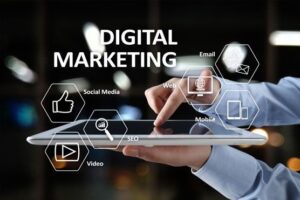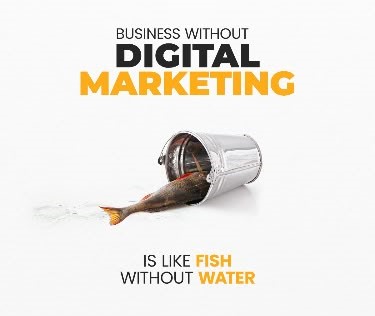The Power of Digital Marketing: Why Your Business Needs It
In today’s world, where nearly every aspect of our lives has been touched by technology, digital marketing has become a vital part of business success. Whether you are a small startup or a large corporation, embracing digital marketing strategies can provide you with the tools to grow your brand, increase sales, and engage with a global audience.
What is Digital Marketing?
Digital marketing is the umbrella term for all marketing efforts that use an electronic device or the internet. It encompasses a wide range of tactics, including but not limited to:
-
Social Media Marketing: Leveraging platforms like Facebook, Instagram, Twitter, and LinkedIn to engage with your target audience.
-
Content Marketing: Creating valuable, relevant content that attracts, engages, and educates potential customers.
-
Email Marketing: Sending personalized messages and offers to a targeted group of people via email.
-
Search Engine Optimization (SEO): Optimizing your website and content so it ranks higher in search engine results.
-
Pay-Per-Click (PPC) Advertising: Using paid ads to drive traffic to your website.
-
Affiliate Marketing: Partnering with other businesses or influencers to promote your product.


Why Digital Marketing?
1. Cost-Effective
Compared to traditional marketing methods like TV ads or print media, digital marketing can be much more affordable. Social media campaigns, email marketing, and content creation can all be done on a relatively small budget, making it easier for businesses of all sizes to compete.
2. Global Reach
One of the major advantages of digital marketing is the ability to reach a global audience. Whether you’re targeting local customers or looking to expand into international markets, the internet provides the infrastructure to do so.
3. Targeted Advertising
Unlike traditional advertising methods, digital marketing allows you to target your audience more precisely. With tools like Google Ads or Facebook Ads, you can focus your ads on specific demographics such as age, gender, interests, or location, ensuring your content reaches the people most likely to convert into customers.
4. Real-Time Analytics
One of the greatest benefits of digital marketing is the ability to measure results in real time. Using tools like Google Analytics, you can track website traffic, conversions, social media engagement, and much more. This data allows you to tweak your strategies on the fly, improving your chances of success.
5. Increased Engagement
With digital marketing, businesses can engage directly with their audience. Whether it’s responding to comments on a social media post, answering queries through live chat on your website, or collecting feedback through surveys, this direct interaction fosters trust and builds customer loyalty.
Key Digital Marketing Strategies for Success
1. SEO (Search Engine Optimization)
SEO is the practice of optimizing your website so that it ranks higher in search engine results. The goal is to increase organic (non-paid) traffic by appearing on the first page of Google for relevant keywords. It’s crucial to optimize both on-page (content, keywords, meta descriptions) and off-page factors (backlinks, social signals).
2. Social Media Marketing
Social media is one of the most powerful tools in digital marketing. Platforms like Instagram, Facebook, LinkedIn, and Twitter allow businesses to connect with customers, share content, and promote products. The key to success on social media is consistency, valuable content, and audience engagement.
3. Content Marketing
Content marketing is all about creating valuable, relevant, and consistent content to attract and retain a defined audience. This could be blog posts, infographics, videos, podcasts, or case studies. Good content not only drives traffic to your website but also positions your business as an authority in your field.
4. Email Marketing
Email marketing is a great way to keep customers informed, build relationships, and increase sales. By collecting email addresses through your website or social media channels, you can send newsletters, promotional offers, and personalized content directly to your audience. Segmentation and personalization are key to making email marketing effective.
5. PPC Advertising
Pay-Per-Click (PPC) advertising involves paying for ads that appear on search engines or social media platforms. You only pay when someone clicks on your ad, which makes it a cost-effective way to drive targeted traffic. Google Ads and Facebook Ads are two of the most popular platforms for PPC campaigns.

The Future of Digital Marketing
As technology continues to evolve, so does the world of digital marketing. Some of the trends to watch for in the future include:
-
AI and Automation: AI-powered tools are becoming more common in digital marketing, from chatbots for customer service to advanced data analytics that can predict customer behavior.
-
Voice Search: With the rise of voice-activated devices like Alexa and Google Assistant, optimizing for voice search will become increasingly important.
-
Video Marketing: Video continues to be one of the most engaging forms of content, and platforms like YouTube, TikTok, and Instagram Reels are becoming essential for brands to connect with their audience.

Conclusion
In the ever-evolving world of marketing, digital marketing is no longer a choice; it’s a necessity. From small businesses looking to build an online presence to large corporations aiming to strengthen their brand, digital marketing provides the tools and strategies necessary to succeed. The key is to stay informed, embrace new technologies, and always put your audience first.
By integrating a strong digital marketing strategy into your business plan, you’re setting yourself up for growth, visibility, and long-term success. So, if you haven’t already, now is the perfect time to start exploring the endless possibilities digital marketing offers!